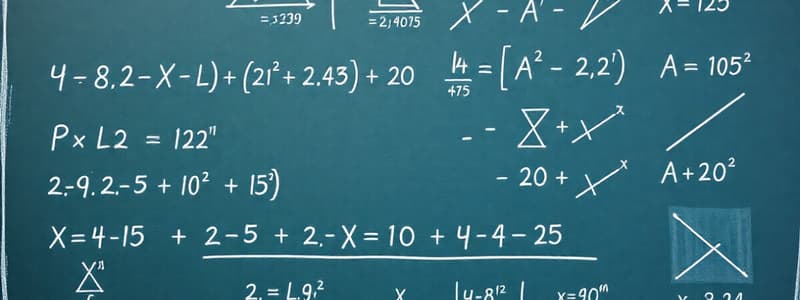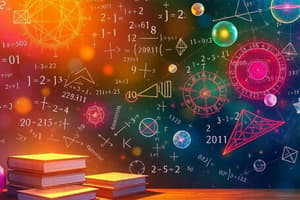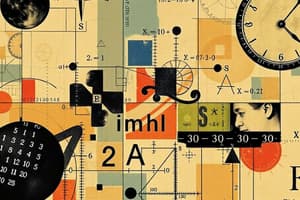Podcast
Questions and Answers
What is a complex number defined as?
What is a complex number defined as?
- A real number multiplied by itself.
- A number in the form a + bi, where a and b are real numbers and i = √-1. (correct)
- A number in the form a + b, where a and b are both integers.
- A number expressed as a ratio of two integers.
Which property of equality states that if a = b, then a + c = ?
Which property of equality states that if a = b, then a + c = ?
- b + c (correct)
- c + a
- c - b
- b + a
What is the first step in the order of operations when evaluating expressions?
What is the first step in the order of operations when evaluating expressions?
- Multiplication and Division
- Exponents
- Addition and Subtraction
- Parentheses (correct)
Which equation correctly represents a proportion?
Which equation correctly represents a proportion?
In problem-solving, what is essential to do after developing a plan?
In problem-solving, what is essential to do after developing a plan?
Which of the following describes arithmetic operations?
Which of the following describes arithmetic operations?
What is the purpose of algebra in mathematics?
What is the purpose of algebra in mathematics?
Which of the following is a fundamental concept of calculus?
Which of the following is a fundamental concept of calculus?
Which of the following correctly defines irrational numbers?
Which of the following correctly defines irrational numbers?
What is one application of statistics?
What is one application of statistics?
Which property is NOT an arithmetic property?
Which property is NOT an arithmetic property?
What does a derivative measure in calculus?
What does a derivative measure in calculus?
Which type of numbers includes both positive and negative integers?
Which type of numbers includes both positive and negative integers?
Flashcards
Arithmetic
Arithmetic
Basic math operations like addition, subtraction, multiplication, and division.
Algebra
Algebra
Using symbols for unknowns to explore relationships between quantities.
Geometry
Geometry
Study of shapes, sizes, and positions of objects.
Calculus
Calculus
Signup and view all the flashcards
Statistics
Statistics
Signup and view all the flashcards
Integers
Integers
Signup and view all the flashcards
Real Numbers
Real Numbers
Signup and view all the flashcards
Natural Numbers
Natural Numbers
Signup and view all the flashcards
Complex Number Form
Complex Number Form
Signup and view all the flashcards
PEMDAS/BODMAS
PEMDAS/BODMAS
Signup and view all the flashcards
Equality Property
Equality Property
Signup and view all the flashcards
Solving Problems
Solving Problems
Signup and view all the flashcards
Problem-Solving Key
Problem-Solving Key
Signup and view all the flashcards
Study Notes
Fundamental Concepts
- Mathematics is the study of quantity, structure, space, and change.
- It uses logic and abstraction to explore patterns and relationships.
- Key areas include arithmetic, algebra, geometry, calculus, and statistics.
- Mathematical concepts are widely used in various fields, such as science, engineering, and computer science.
Arithmetic
- Arithmetic involves basic operations: addition, subtraction, multiplication, and division.
- It forms the foundation for more advanced mathematical concepts.
- Whole numbers, integers, fractions, and decimals are fundamental concepts.
- Properties of operations (commutative, associative, distributive) are crucial.
Algebra
- Algebra uses symbols to represent unknowns and variables.
- It explores relationships between quantities.
- Equations and inequalities are used to model and solve problems.
- Fundamentals include solving linear equations, quadratic equations, and systems of equations.
- Polynomials and functions are essential components.
Geometry
- Geometry deals with shapes, sizes, and positions of objects.
- It explores properties of lines, angles, triangles, quadrilaterals, circles, and other shapes.
- Euclidean geometry is a basic system of plane and solid geometry.
- Transformations (translations, rotations, reflections) are essential.
- Three-dimensional shapes and solids are also studied.
Calculus
- Calculus deals with change and motion.
- Differentiation and integration are fundamental concepts.
- Derivatives measure the rate of change.
- Integrals calculate accumulated change.
- Applications include finding areas, volumes, and solving optimization problems.
Statistics
- Statistics involves collecting, organizing, and interpreting numerical data.
- It uses graphical and numerical summaries to analyze patterns and trends.
- Mean, median, mode, and standard deviation are crucial measures.
- Probability is a major component of statistics.
- Statistical methods are used in various fields for data analysis and decision making.
Number Systems
- Natural numbers (counting numbers): 1, 2, 3, ...
- Whole numbers: 0, 1, 2, 3, ...
- Integers: ..., -3, -2, -1, 0, 1, 2, 3, ...
- Rational numbers: numbers that can be expressed as a fraction p/q, where p and q are integers and q ≠ 0.
- Irrational numbers: numbers that cannot be expressed as a fraction. (e.g., π, √2)
- Real numbers: the set of all rational and irrational numbers.
- Complex numbers: numbers that can be expressed in the form a + bi, where a and b are real numbers and i = √-1.
Basic Mathematical Principles
- The order of operations (PEMDAS/BODMAS): Parentheses, Exponents, Multiplication and Division (from left to right), Addition and Subtraction (from left to right).
- Properties of equality: If a = b, then a + c = b + c.
- Properties of inequality: If a > b, then a + c > b + c.
- Proportions: a/b = c/d.
Problem Solving in Mathematics
- Understanding the problem statement is key.
- Identifying the given information and what is needed to be found.
- Developing a plan to solve the problem. This might involve using formulas, diagrams, or reasoning.
- Implementing the plan systematically.
- Checking the answer for accuracy and reasonableness.
- Practicing with various problem types.
Studying That Suits You
Use AI to generate personalized quizzes and flashcards to suit your learning preferences.




